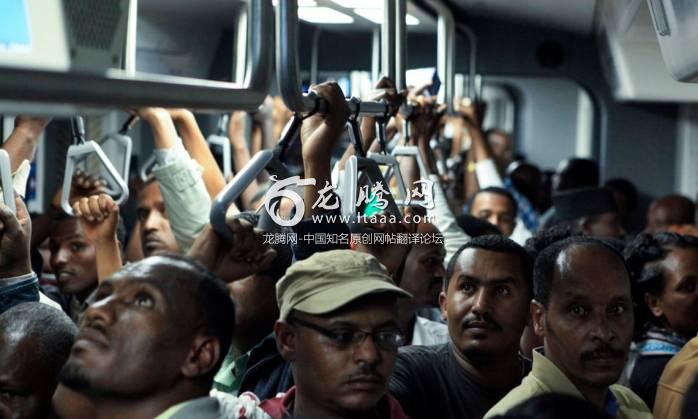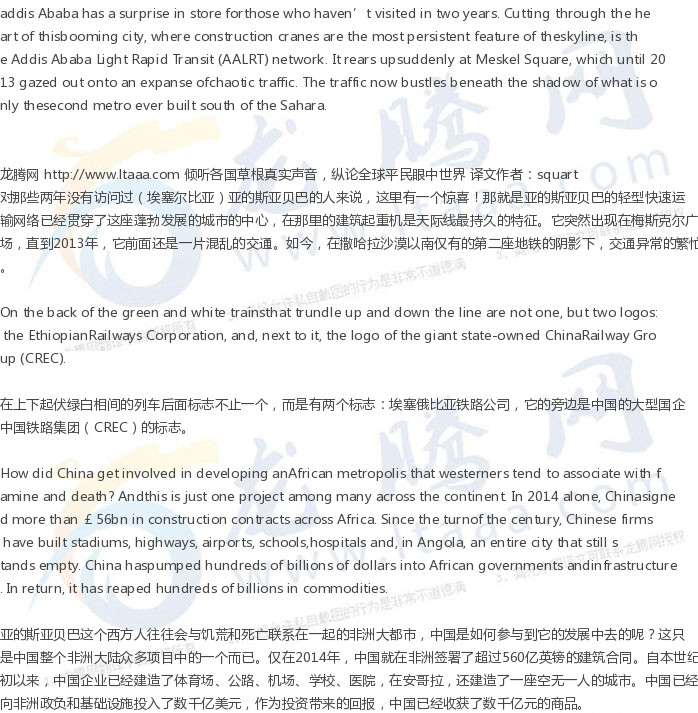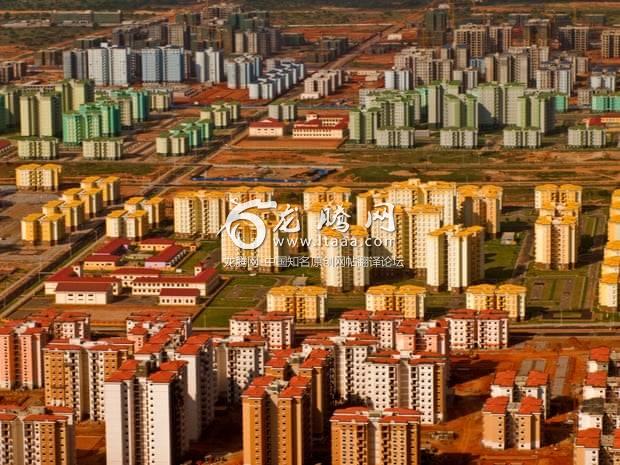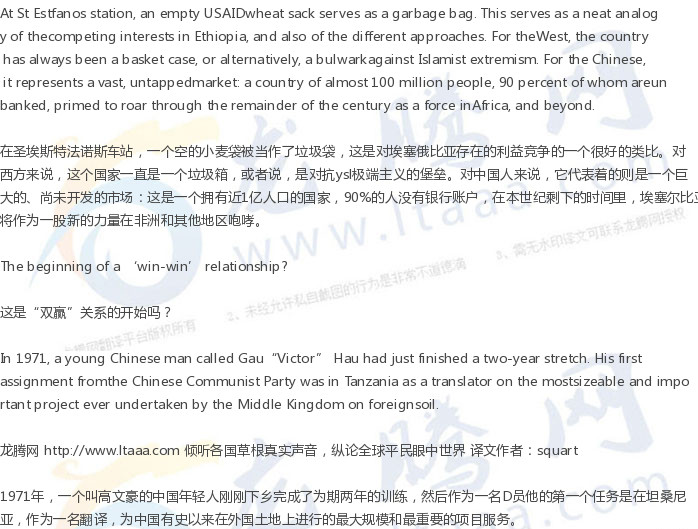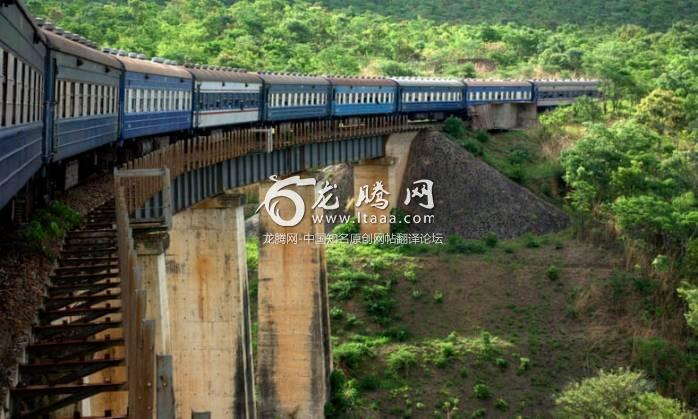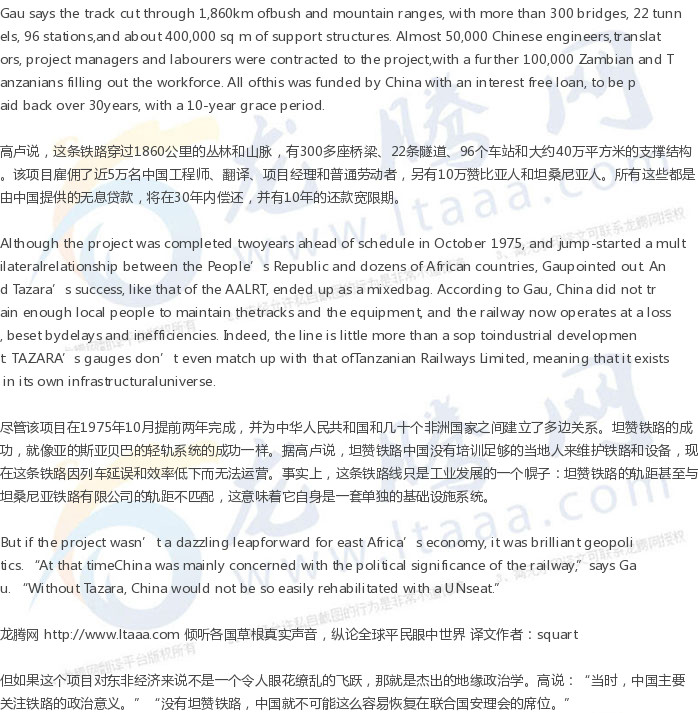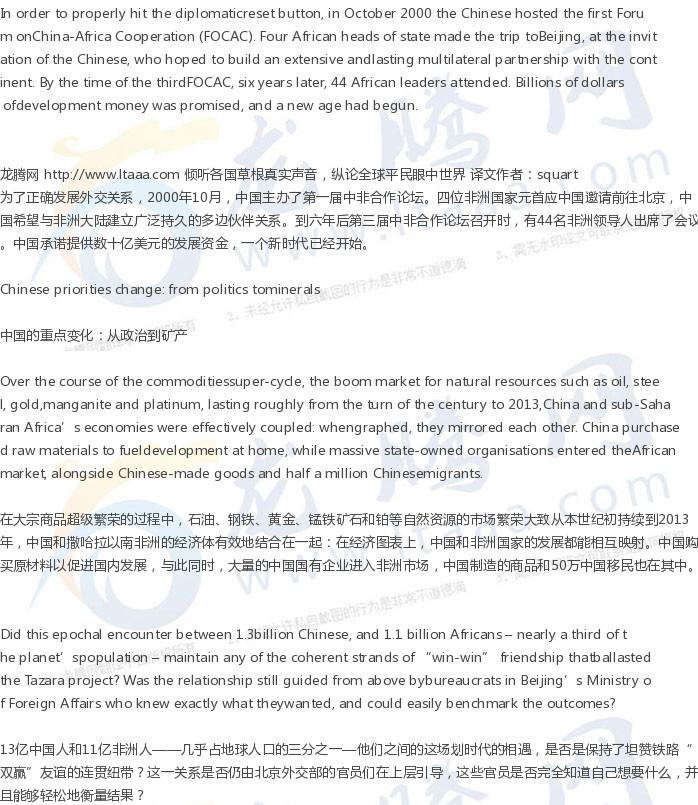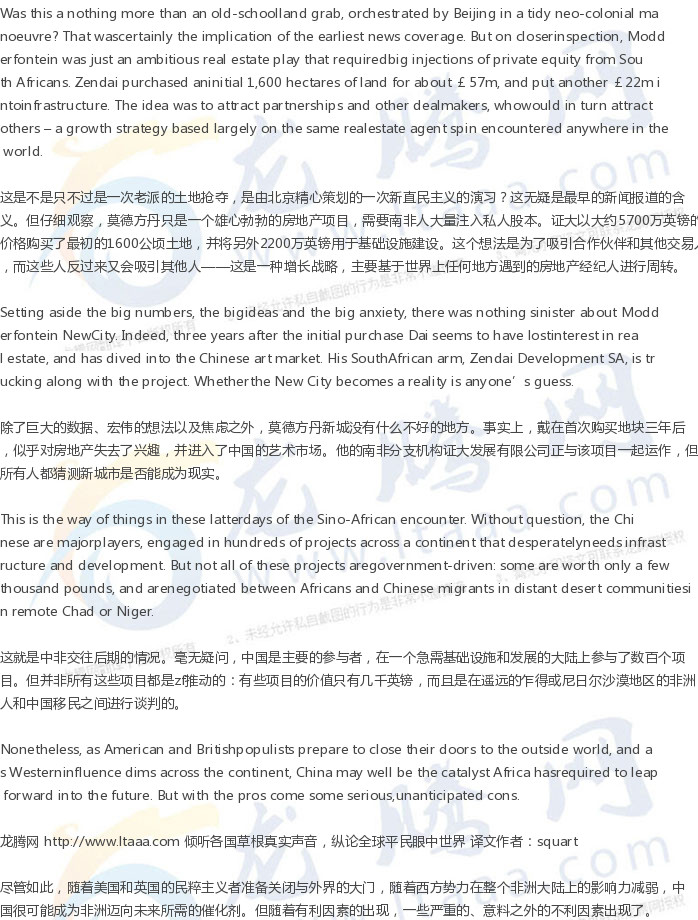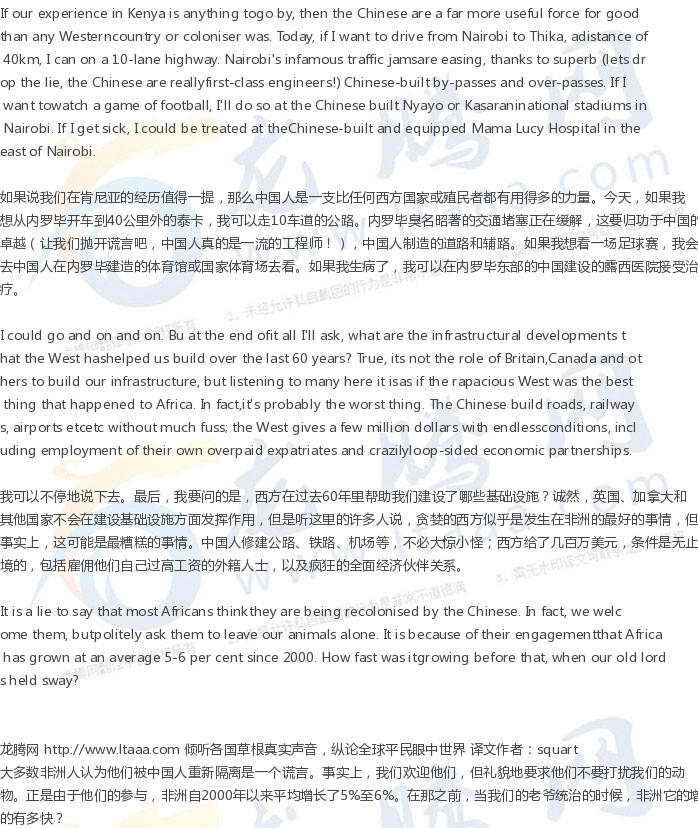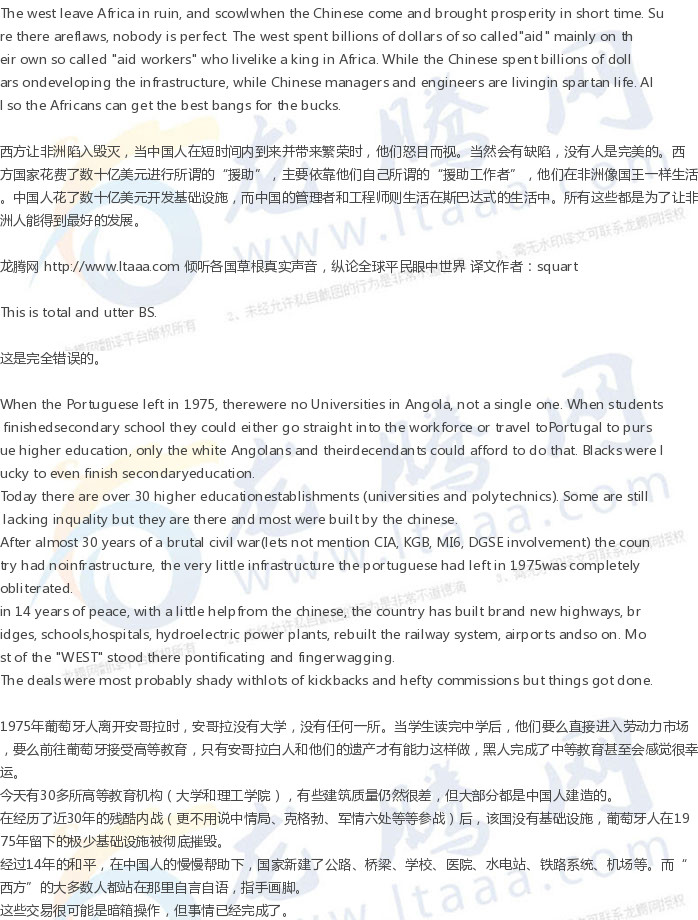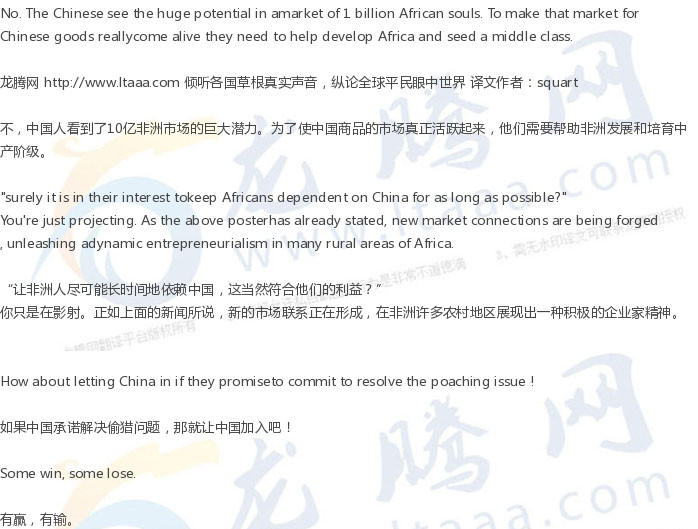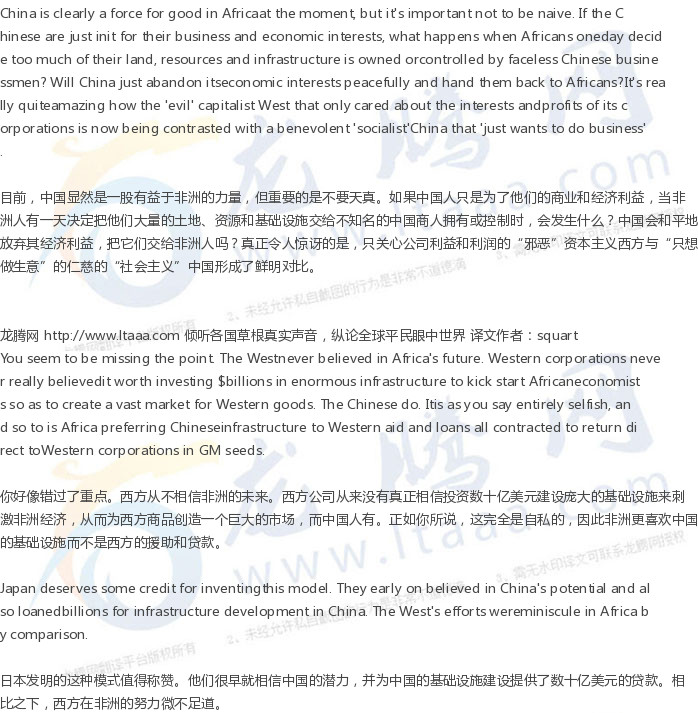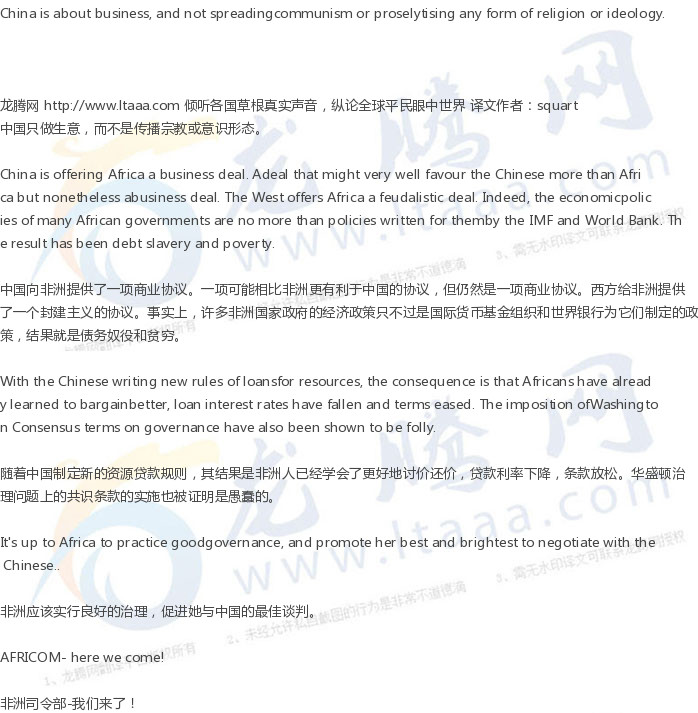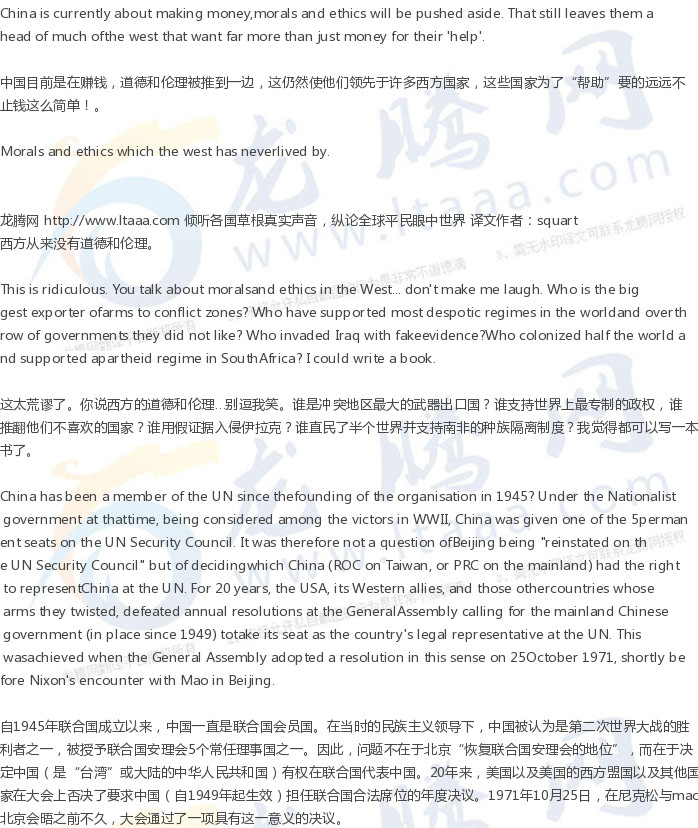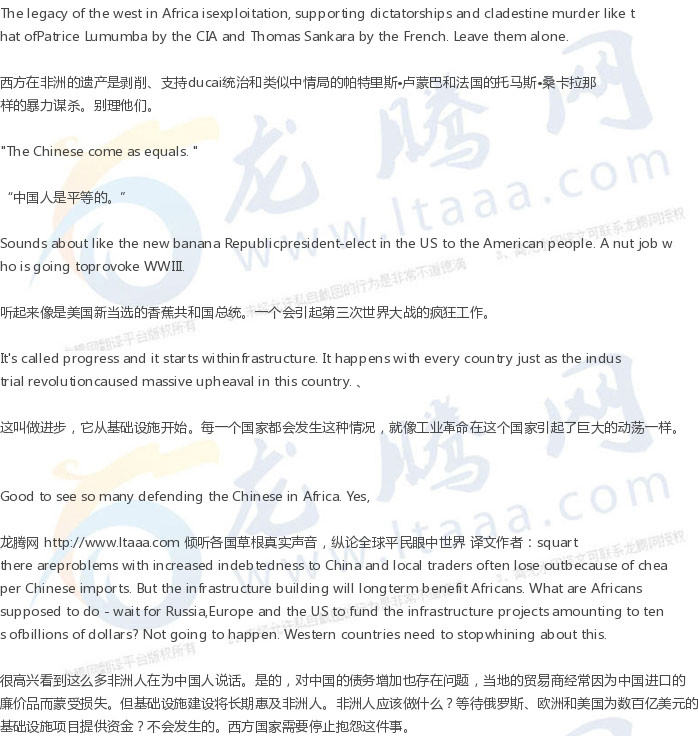(评论)新一轮对非洲的争夺:中国如何成为非洲的首选伙伴 [英国媒体]
仅在2014年,中国就向非洲的基础设施项目投资了560亿英镑。但是,这种直民主义以另一种形式的存在吗?
In 2014 alone China invested £56bn inAfrican infrastructure. But is this colonialism in another guise?
仅在2014年,中国就向非洲的基础设施项目投资了560亿英镑。但是,这种直民主义以另一种形式的存在吗?
Few in Africa are certain that there isfair quid pro quo at play here. Is this the dawn of a new colonialism, theywonder, a new scramble for Africa in which the continent is once again left intatters? Or is it the beginning of an era during which Africans shake off oldcolonial masters and look elsewhere for direct investment and aid?
在非洲,很少有人敢肯定这里面是非常公平的交易。他们想知道,这是否是新直民主义的开始,是对非洲大陆的新开始的一场争夺,是非洲大陆的又一次破败不堪?或者,这是一个时代的开始,在这个时代,非洲人摆脱了旧的直民统治,寻求其他地方的直接投资和援助?
The Light Railway goes some way toanswering these questions. The project dates back to December 2011 when theidea for a 34.25km electrified light railway secured funds from Exim Bank ofChina. Construction for the 39-station project began in 2013 and the metroopened in September 2015, well ahead of schedule.
(亚的斯亚贝巴)轻轨在某种程度上回答了这些问题。该项目可追溯到2011年12月,当时建设一条34.25公里的电气化轻轨铁路的计划从中国进出口银行获得了资金。39站项目于2013年开工建设,地铁于2015年9月开通,这比初始计划大大的提前了。
The line has cost $475m, 85% of which wasloaned by Chinese policy banks or enterprises. The project was a collaborationbetween CREC and the Ethiopian Railways Corporation, the junior partner, whilethe Shenzen Metro Group and CREC will serve as operations managers for the nextfive years until a planned handover to the local rail authorities.
这条轻轨铁路线的成本为4.75亿美元,其中85%由中国政策性银行或企业提供贷款。这个项目是中国中铁集团与埃塞俄比亚铁路公司(初级合伙人)的合作项目,而深圳地铁集团和中国中铁将在未来五年担任运营,直至按照计划移交给当地铁路当局为止。
The metro moves about 15,000 people perline per day and costs about six birr (10p) a ride. But describing it as anoutright success would be a stretch. The construction often looks slapdash – astandard complaint about Chinese construction projects across the continent.
这条地铁每天每条线路大约运送15000人,一次大约花费6比尔(10便士)。但彻底将它称作成功的项目还早,这项工程通常看起来很乏味—这是对中国大陆建筑项目的一个标准印象。
Now Gau is a career railway adviser for themassive state owned entity, China Railway Construction Corporation Limited(CRCC). But in 1971 his ability to speak English was crucial to a huge railwayproject planned between Tanzania and Zambia. In the late 1960s, Chairman Maoand the Chinese Communist Party (CCP) had entered into an agreement withTanzanian liberation hero Julius Nyerere and his Zambian contemporary KennethKaunda. They would build a railway line from the Tanzanian port city of Dar esSalaam to Kapiri Mposhi, located in Zambia’s copper belt. For Kuanda, therailway was an existential necessity: surrounded by white supremacist regimesin Rhodesia and South Africa, there was no way for him to export his primaryresource to the sea. Hence, the Uhuru (Kiswahili for “freedom”) Railway.
现在,高卢是大型国有企业中国铁路建设股份有限公司(CRCC)的职业铁路顾问。但在1971年,他的英语能力对坦桑尼亚和赞比亚之间这个大型铁路项目至关重要。20世纪60年代末,中国领导人与坦桑尼亚解放英雄朱利叶斯•尼雷尔及其同时代的赞比亚人肯尼思•卡翁达达成了协议。他们将修建一条从坦桑尼亚港口城市达累斯萨拉姆到位于赞比亚铜矿带的的铁路线。对于卡翁来说,铁路是一个必须要有的条件:在罗得西亚(津巴布韦的旧称)和南非,这两个国家都是白人至上主义,所以他无法将其主要资源运输到海港。因此,坦赞铁路诞生了。
For the CCP, the project was no less vital.Prior to rapprochement with the Nixon administration in 1972, and during Mao’slengthy enmity with the Soviet Union, China was subject to diplomatic purdah.To secure enough votes to become reinstated on the UN Security Council Beijingrequired allies, and hoped to find the necessary support in Africa. TheTanzania-Zambia Railway Authority (Tazara) line, to be paid for in full by theChinese, was the beginning of what Beijing promised would be a “win-winrelationship”, a kinship based on mutual need to fend off shared antagonisms.
对中国来说,这个项目同样至关重要。1972年,在与尼克松政f和睦相处之前,以及中国与苏联长期敌对期间,中国受到外交上的困扰。为了获得足够多的选票恢复联合国安理会的席位,北京需要盟友,并希望在非洲找到必要的支持。坦赞铁路线路是北京承诺的“双赢关系”的开端,这是一种基于相互需要的友好关系,以抵御共同的敌对情绪。
But there was a second, perhaps even morepragmatic, reason to build the railway. “We have to rely on importing naturalresources from other countries,” Gau said, seated behind a desk in his largeBeijing office. “If China was to keep up sustainable development for manyyears, China has to secure a supply of natural resources and minerals to feedour industries.”
但修建这条铁路还有第二个原因,也许更为务实。“我们必须依靠从其他国家进口自然资源,”坐在他在北京大型办公室办公桌后面的高说。“如果中国要保持多年的可持续发展,中国必须确保自然资源和矿产的供应,以满足我们的工业发展。”
If Tazara represented the first and mostsignificant attempt to forge a lasting south-south engagement, it remained foralmost three decades an isolated and anomalous project.
如果坦赞铁路代表了建立持久的南南接触的第一次也是最重要的尝试,那么它在近三十年里仍然是一个孤立的项目。
As the 1970s melted into the 1980s, andgave way to a resurgent 1990s under Deng Xiaoping’s mandate of “socialism withChinese characteristics”, when “some would get rich first”, the single greatestpush for growth in the country demanded strong international partnerships if itwere to succeed.
随着20世纪70年代过去20世纪80年代的到来,在邓“中国特色社会主义”的指导下,中国在20世纪90年代又一次复苏了,“让一部分人先致富”,中国经济增长的唯一最大推动力需要强有力的国际伙伴关系才能成功。
Not at all. Since Tazara, the Sino-Africanphenomenon has become much more sophisticated and highly fragmented and is nolonger stage-managed by governments. Nowhere is this better shown than by aproject announced in Johannesburg in 2013. That year, the South African pressbegan reporting on a vast £4.8bn real estate development in Modderfontein,north-east of the city, continually citing that fact that it would be financedand constructed by “the Chinese”.
未必。自坦赞铁路以来,中非关系变得更加复杂和高度分散,不再由国家来主导。2013年约翰内斯堡宣布的一个项目最能说明这一点。那一年,南非媒体开始报道该市东北部莫德方丹一个耗资48亿英镑的巨大房地产开发项目,并不断指出该项目将由“中国人”资助和建设。
The press was never clear on what was meantby “the Chinese”. The details were surprising: the Modderfontein New Cityendeavour was headed by Zendai Group, a Hong Kong-listed company run by aneccentric, goateed entrepreneur named Dai Zhikang. Most of the group’s moresuccessful projects were undertaken in Shanghai. The plan was that the SouthAfrican community, stretching over tens of thousands of hectares, would include“all the functions of a city, such as finance, trade, logistics, commerce,technology, education, health care and housing”. Modderfontein New City, thecompany’s website insisted, would become “the New York of Africa,” with twistypostmodern skyscrapers and gigantic retail outlets, all operating on a greengrid.
媒体对“中国人”的含义一直不清楚。但细节令人惊讶:莫德芬特新城市是由证大集团领导的,这是一家香港上市公司,由一名叫戴志康的企业家经营。该集团最成功的项目大多在上海进行。该计划是,其南非社区将占地数万公顷,将包括“城市的所有功能,如金融、贸易、物流、商业、技术、教育、医疗和住房”。该公司网站坚持称,莫德方丹新城将成为“非洲的纽约”,拥有曲折的后现代摩天大楼和庞大的商业网点,所有这些都在绿色电网上运行。
Addis Ababa’s light railway, while ithasn’t quite made beaten up Lada taxis obsolete, has so thoroughly transformedthe city that it counts as a work of urban alchemy. But the social cost may yetprove immense: as Addis expands and explodes, the city’s borders push into landbelonging to the Oromo people, causing social ruptures and violence.
亚的斯亚贝巴的轻轨虽然还没有完全取代老旧的出租车,但已经彻底改变了这个城市,它被看作该城市的神奇变化。但是,其所需的社会成本可能也仍然是很巨大的:随着亚的斯的城市的扩张和爆发性发展,城市的边界进入了属于奥罗莫人的土地,这导致了社会破裂和暴力。
Would a new government be as amenable tothe Chinese? These questions abound in Africa, as certain regimes teeter,others tumble, and still others harden into lengthy runs at the helm. If theChinese were once hoping for a comprehensive, mandated south-south axis, theyhave ended up with something more and less than that: an economic, cultural andsocial encounter that is changing the world, one railway line at a time.
一个新的埃塞俄比亚政f会对中国人像以前一样顺从吗?在非洲,这些问题比比皆是,因为某些国家摇摇欲坠,还有一些国家掌权者变得强硬起来。如果中国曾经希望建立一个全面的、强制性的南南轴心,那么他们最终会遇到越来越少的事情:一次一条铁路线,一次改变世界的经济、文化和社会遭遇。
Sorry Guardian, how is this"neo-colonialism"? I don't see any Chinese military invading anyonein Africa, forcing governments to submit to them or just stealing entirecountries, just businessmen and governments cutting deals, both good and bad...
对不起卫报,这是“新直民主义”吗?我看不到任何中国军队入侵非洲,强迫非洲屈服于他们,或窃取整个国家,这里只是商人和非洲在做买卖,不管是好的还是坏的……
I guess you can't conceive of the idea ofanyone doing business in Africa without guns and/or condescension (vis.Europe). How sad.
我想你想不到在非洲做生意居然可以没有枪声或者强迫。欧洲国家该有多伤心啊!
Bwana, the west is in terminal decline. Bythe time the planning permission to build a 200 m bicycle path gets through thebureaucracy of any western city council, the Chinese will have built an airportor housing for 70000 people. There is so much procrastination and bureaucracyin the west that it makes the old soviet countries look productive at times..It is a mentality thing which will not change easily.
西方正在走向衰落。在规划许可修建一条200米长的自行车道通过任何西方城市议会的官僚机构时,中国人都能够建造一个可容纳7万人的机场或住房。西方国家有太多的拖拉和官僚主义,使得就像旧苏联这样的国家有时都看起来富有成效。这是一种不易改变的心态。
The real Colonialists never investedanything into the African continent. Thats why history doesnt really say nicethings about them.
真正的殖民者从未向非洲大陆投资过任何东西。这就是为什么历史并没有真正地对他们说好话的原因。
Would Eritrea be an example? It's now ahellhole and anyone with any sense of history knows it was better run as anItalian colony.
厄立特里亚会是一个例子吗?它现在是一个地狱,任何有历史感的人都知道它最好作为意大利殖民地来经营。
Maybe you should go and make that arguementto the Eritrians.
也许你应该去和厄立特里亚人争论。
The chinese ventured into Africa and arereaping the benefits.
African nations have to develop into arelationship where know how is left behind so they can maintain the big infrastructureprojects.
中国人冒险进入非洲并从中获益。
非洲国家必须发展成一种关系,在这种关系中,他们必须掌握如何才能维护大型基础设施项目。
And why exactly would the Chinese want todo that? If they're just in Africa to make money by doing business, surely itis in their interest to keep Africans dependent on China for as long aspossible?
为什么中国人要这么做?如果他们只是在非洲经商赚钱,那么让非洲人尽可能长时间地依赖中国肯定符合他们的利益?
The current relationship between Africansocieties and China cannot, by any stretch of the imagination, be described as"colonialist." On the contrary, the peoples of Africa and the peopleof China are working closely together to develop their respective economiesthrough contractual relationships that are of mutual benefit to both parties.To argue that the Chinese are colonizing Africans is to imply that the Chineseare stealing African resources--including African material resources andAfrican labour--on the basis of oppressive infrastructure that they haveimposed on African societies. This is not what is happening. Rather, Africansocieties are exchanging their abundant resources for infrastructure and skillsoriginating from China that they need in order for them to modernize enough tobe in a position to compete for the world's resources with other parts of theworld on a co-equal basis. The former colonial powers did not provide Africansocieties with the opportunity to even begin to dream of"development" in that regard.
In fact, I would go so far as to urgeAfrican societies to strengthen their relationships with China (withoutnecessarily undermining their relationships with other parts of the world--sincethe two are not necessarily mutually exclusive with respect to Africa) in orderfor them to reap the benefits of the partnerships most fully. One means bywhich they could achieve that objective would be for them to take advantage ofthe contracts for projects that they sign with Chinese companies to ensure thatthe skills that the Chinese transfer to African societies through thoseprojects are marshaled and deployed accordingly. For example, they couldrequire that an important aspect of every one of those contracts should includetraining of sizable numbers of interns drawn from their colleges anduniversities through appropriately formulated coursework. If such schemes areproperly conceptualized and undertaken, they could constitute an interestingavenue through which the skills that African societies so desperately requirewill be transferred from China to Africa and utilized to develop Africansocieties in the future.
非洲社会与中国目前的关系,在任何程度上都不能被描述为“直民主义者”,相反,非洲人民和中国人民正密切合作,通过对双方都有利的条约关系发展各自的经济。认为中国人在直民非洲人,这意味着中国人是在强加给非洲社会压迫性基础设施的基础上,正在窃取非洲资源,包括非洲物质资源和非洲劳动力。但这不是正在发生的事情。相反,非洲社会正用其丰富的资源交换中国的基础设施和技术,以使它们能够实现足够的现代化,从而能够在平等的基础上与世界其他地区竞争世界资源。前直民大国没有给非洲社会提供机会,甚至没有开始在这方面实现“发展”的梦想。
事实上,我会敦促非洲社会加强与中国的关系(不一定破坏与世界其他地方的关系,因为这两个国家在非洲并不一定是相互排斥的),以便他们最充分地获得伙伴关系的好处。他们实现这一目标的一种方法是利用与中国公司签订的项目合同,确保中国通过这些项目向非洲社会转移的技能得到相应的应用和部署。例如,他们可能要求这些合同的一个重要方面应包括通过适当制定的课程作业从学院和大学抽取大量实习生进行培训。如果这些计划得到正确的理解和实施,它们将形成一个有意义的方法,通过这种方法,非洲社会迫切需要的技能将从中国转移到非洲,并在未来用于发展非洲社会。
"If the Chinese are just in it fortheir business and economic interests, what happens when Africans one daydecide too much of their land, resources and infrastructure is owned orcontrolled by faceless Chinese businessmen?"
Renegotiate the business arrangement? Afterall the Chinese have paid for every piece of property they hold in Africa,instead of taking out their guns and demanding that everything be given to themfor free.
如果中国人只是为了他们的商业和经济利益,当非洲人有一天决定把他们大量的土地、资源和基础设施交给不知名的中国商人拥有或控制时,会发生什么?
重新谈判业务安排?毕竟,中国人已经支付了他们在非洲持有的每一块财产,而不是拿出他们的枪,要求免费给他们所有的东西。
"That year, the South African pressbegan reporting on a vast £4.8bn real estate development in Modderfontein,north-east of the city, continually citing that fact that it would be financedand constructed by “the Chinese”.
This is all too familiar in my country withmostly whites and their media apprehensive against anything non western,including the current nuclear deal being negotiated with the Russians, or theSouth African government's relationship with the AU or Cuba.
“那年,南非媒体开始报道该市东北部莫德方丹48亿英镑的巨大房地产开发项目,并不断指出该项目将由“中国人”提供资金和建设。
在我们国家,这一切都太熟悉了,大多数是白人,他们的媒体对任何非西方国家都感到担忧,包括目前正在与俄罗斯谈判的核协议,或者南非政府与非盟或古巴的关系。
Libya which provided massively to theinfrastructural development of African institutions has been reduced to rubble.China is building bridges..and making friends, while the US are burning them ina scorched earth manner and making enemies, and referring to everything asweapons, and using the language of war to describe trade.
利比亚为非洲机构的基础设施发展提供了大量的资金,但现在已沦为废墟。中国正在架起桥梁……结交朋友,而美国却在用焦土的方式焚烧它们,制造敌人,把一切都称为武器,并用战争的语言来描述贸易。
The AU has rejected a permanent militarybase on the continent, but the US is using chicanery by bribing the supinestrongman of Africa in the military, in the same way she did in the Americas.The US military footprint has grown in the continent under the disguise offighting terrorism, but this is in effect to counter China's growing economicinfluence and keep Africans in western servitude.
非盟拒绝在非洲大陆建立永久性军事基地,但美国却在利用诡计贿赂非洲人,就像她在美洲那样。美国的军事足迹是在与恐怖主义作斗争的伪装下在非洲大陆增长的,但这实际上是为了对抗中国日益增长的经济影响力,使非洲人保持西方的奴役地位。
When western interests are threatened,democracy is not an option. History is a good teacher.
当西方利益受到威胁时,抿住不是一种选择。历史是一位好老师。
The Chinese are consistent in their noninterference in the domestic politics of their trading partners. They alsounderstand that social development trumps democracy every time.
中国人一贯不干涉贸易伙伴的国内政治。他们也明白社会发展每时每刻都胜过抿住。
I really dislike these kind of patronisingarticles. It is like Africans are children. What the Chinese and Africans seeis opportunities to work with each other. The west is t too obsessed with thepast. They see themselves like African guardians, like the Africans should seektheir approval for whatever they do. The Chinese come as equals. They seepeople not children. They see potential not poverty. They see hope and not pity.They look into the future and not the past and they do not come with illconceived and half baked ideas like what the IMF did destroying whateverwelfare for the poor there was in 1980s with their structural adjustmentprogrammes.
我真的不喜欢这类冠冕堂皇的文章。就像非洲人是孩子一样。中国人和非洲人看到的是彼此合作的机会。西方人不要太沉迷于过去,他们还认为自己就像非洲的守护者一样,就像非洲人应该为他们所做的一切寻求他们的认可。中国人是平等的,他们看到的非洲人是人而不是孩子,他们看到的是潜力而不是贫穷,他们看到的是希望而不是怜悯,他们着眼于未来,而不是过去,他们也不会产生像国际货币基金组织在1980年代通过结构调整计划摧毁穷人的任何福利这样的想法。
I wonder what is best for Africans, a bagof Maize/wheat/Rice or Slapdash infrastructure!!
我想知道什么是最适合非洲人的,一袋玉米/小麦/大米或基础设施!!
The two are not mutually exclusive. Africansocieties are pursuing both ideas.
这两者并不相互排斥。非洲社会正在追求这两种理念。
版权声明
我们致力于传递世界各地老百姓最真实、最直接、最详尽的对中国的看法
【版权与免责声明】如发现内容存在版权问题,烦请提供相关信息发邮件,
我们将及时沟通与处理。本站内容除非来源注明五毛网,否则均为网友转载,涉及言论、版权与本站无关。
本文仅代表作者观点,不代表本站立场。
本文来自网络,如有侵权及时联系本网站。
图文文章RECOMMEND
热门文章HOT NEWS
-
1
最近,新冠肺炎疫情在日本有扩大的趋势,有专家呼吁日本应当举国行动起来,共...
- 2
- 3
- 4
- 5
- 6
- 7
- 8
- 9
- 10
推荐文章HOT NEWS
-
1
最近,新冠肺炎疫情在日本有扩大的趋势,有专家呼吁日本应当举国行动起来,共...
- 2
- 3
- 4
- 5
- 6
- 7
- 8
- 9
- 10
